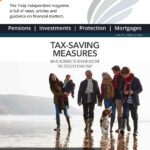In times of financial stress or uncertainty, it may be tempting to hit pause on your pension contributions. However, before you do so, it’s essential to understand the long-term implications this decision may have on your retirement savings plan.
Decisions to increase short-term income can dramatically affect future wealth. It may seem like a viable solution to current financial struggles to reduce or stop pension contributions. However, this short-term increase in take-home pay can significantly impact long- term pension values. Higher earners stand to lose almost four times as much.
TAX RELIEF ADVANTAGE
Pension contributions attract tax relief. Research shows that a worker earning £35,000 annually and saving 5% in a workplace pension scheme matched by their employer could increase their take-home pay by £117 monthly, or £1,404 yearly, if they stopped paying into their pension. But they would lose £341 monthly, or £4,092 yearly, in pension savings due to lost matched contributions and tax relief.
MAGIC OF COMPOUNDING
Pension wealth hugely benefits from compounding – the longer money is invested, the more it could grow. In 20 years, the £4,092 could have boosted the pension pot by £10,575 through investment growth if contributions hadn’t been paused.
IMPACT ON HIGHER EARNERS
For higher rate taxpayers earning £70,000, the difference is even more significant. They could increase their take-home pay by £3,360 yearly by stopping 8% matched pension contributions. However, their pension pot would be worse off by £12,192 in that period. Their pension savings would also be worse off by a projected £31,508 in 20 years if they had not taken a one-year pause.
THE TOLL ON PERSONAL FINANCES
The research involving over 6,000 UK adults shows that the past two years have strained people’s finances. A third (33%) of workers across all age groups confessed to decreasing or stopping their pension contributions. Among younger workers, the figures are even more alarming – nearly half (49%) of workers aged 18-34 are looking at the impact of adjusting their pension contributions.
COST OF OPTING OUT
Exiting your savings scheme means forgoing the benefits of saving through a workplace pension. Initially, you’ll miss out on your employer’s contribution. Any breaks in savings could also delay your retirement or mean you’ll have less income when you stop working. Catching up on any breaks will mean saving even more when you resume to achieve your desired lifestyle in retirement.
WEIGHING UP THE DECISION
While the number of people opting out of schemes remains relatively low, it’s clear that many have considered the option in a bid to boost their take-home pay. However, the decision to pause pension contributions must be weighed carefully, especially for those at the start of their career.
SHORT-TERM GAIN, LONG-TERM LOSS PARADOX
Stopping or reducing contributions might be necessary for some, but decisions mustn’t be taken impulsively. Figures from the research show that the money gained in the short term doesn’t seem like great value when compared to what’s being given up in the long term.
IT’S ESSENTIAL TO FULLY UNDERSTAND THESE IMPLICATIONS BEFORE MAKING A DECISION
While pausing pension contributions may seem like a quick fix in the short term, it could have substantial long-term costs. It’s essential to fully understand these implications before making a decision that could affect your financial security in retirement. For further information or guidance, please get in touch with us. Your financial future is too important to leave to chance.










Follow us